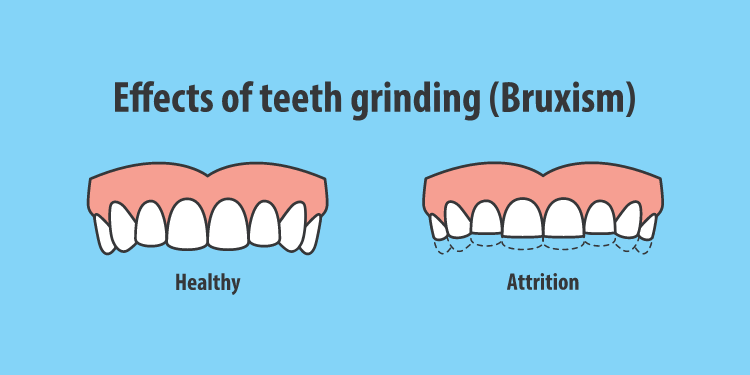Teeth grinding, medically known as bruxism, is a condition where one grinds, gnashes, or clenches their teeth. Unknowingly practicing this habit can lead to long-term dental health issues, including tooth damage, jaw disorders, and chronic pain. Understanding the causes, recognizing the symptoms, and exploring effective treatments can help mitigate these risks and protect your oral health.
What Causes Bruxism?
The exact cause of bruxism is not always clear, but a combination of physical, psychological, and genetic factors may contribute:
- Stress and Anxiety: High levels of stress and anxiety can lead to teeth grinding, especially during sleep.
- Sleep Disorders: People suffering from certain sleep disorders, including sleep apnea, are more prone to bruxism.
- Lifestyle Factors: Consumption of caffeine, alcohol, smoking, and the use of recreational drugs can increase the risk.
- Misaligned Teeth or an Abnormal Bite: An uneven bite or misaligned teeth can also lead to grinding.
- Other Health Conditions: Bruxism can be associated with various medical conditions, such as Parkinson’s disease, dementia, gastroesophageal reflux disorder (GERD), and others.
Symptoms of Bruxism
Many individuals may not realize they grind their teeth because it often occurs during sleep. However, several signs can indicate the presence of bruxism:
- Tooth Sensitivity or Pain: Frequent teeth grinding can lead to increased tooth sensitivity or pain due to enamel erosion.
- Jaw Soreness or Pain: Grinding puts excessive pressure on the jaw muscles and joints, leading to discomfort or pain.
- Headaches: Especially felt in the temples, these headaches may be related to the tension generated from grinding.
- Tooth Damage: Over time, grinding can wear down teeth, leading to fractures, chips, or flattening.
- Sleep Disruption: Bruxism can disrupt sleep patterns, leading to daytime sleepiness.
Treatment Options for Bruxism
While there is no one-size-fits-all solution for bruxism, several treatments and strategies can help manage the condition:
- Stress Management: Since stress is a common trigger, techniques such as meditation, counseling, and exercise can be beneficial.
- Mouthguards: Wearing a custom-fitted mouthguard at night can protect the teeth from grinding damage.
- Dental Correction: Correcting misaligned teeth or an abnormal bite through orthodontics can reduce grinding.
- Medication: In some cases, muscle relaxants or medications for anxiety or sleep disorders can be prescribed to alleviate bruxism.
- Behavioral Therapies: Cognitive-behavioral therapy (CBT) and other behavioral strategies can help change the underlying behaviors associated with bruxism.
- Physical Therapy: Exercises to strengthen the jaw muscles, improve alignment, and promote relaxation can also be effective.
Preventive Measures
Preventing bruxism involves addressing the potential causes before they lead to grinding. Regular dental check-ups can help identify early signs of bruxism, allowing for timely intervention. Maintaining a healthy lifestyle, reducing caffeine and alcohol intake, and establishing a calming bedtime routine can also mitigate the risk.
Closing Thoughts
Bruxism is more than just an annoying habit; it’s a condition that can lead to significant dental health issues if left unaddressed. By understanding its causes, symptoms, and treatments, you can take proactive steps to protect your teeth and overall well-being. If you suspect you or a loved one may be suffering from bruxism, consult with your Honest Dental professional to discuss the most appropriate treatment options tailored to your needs. Remember, early intervention is key to preventing the long-term consequences of teeth grinding.

